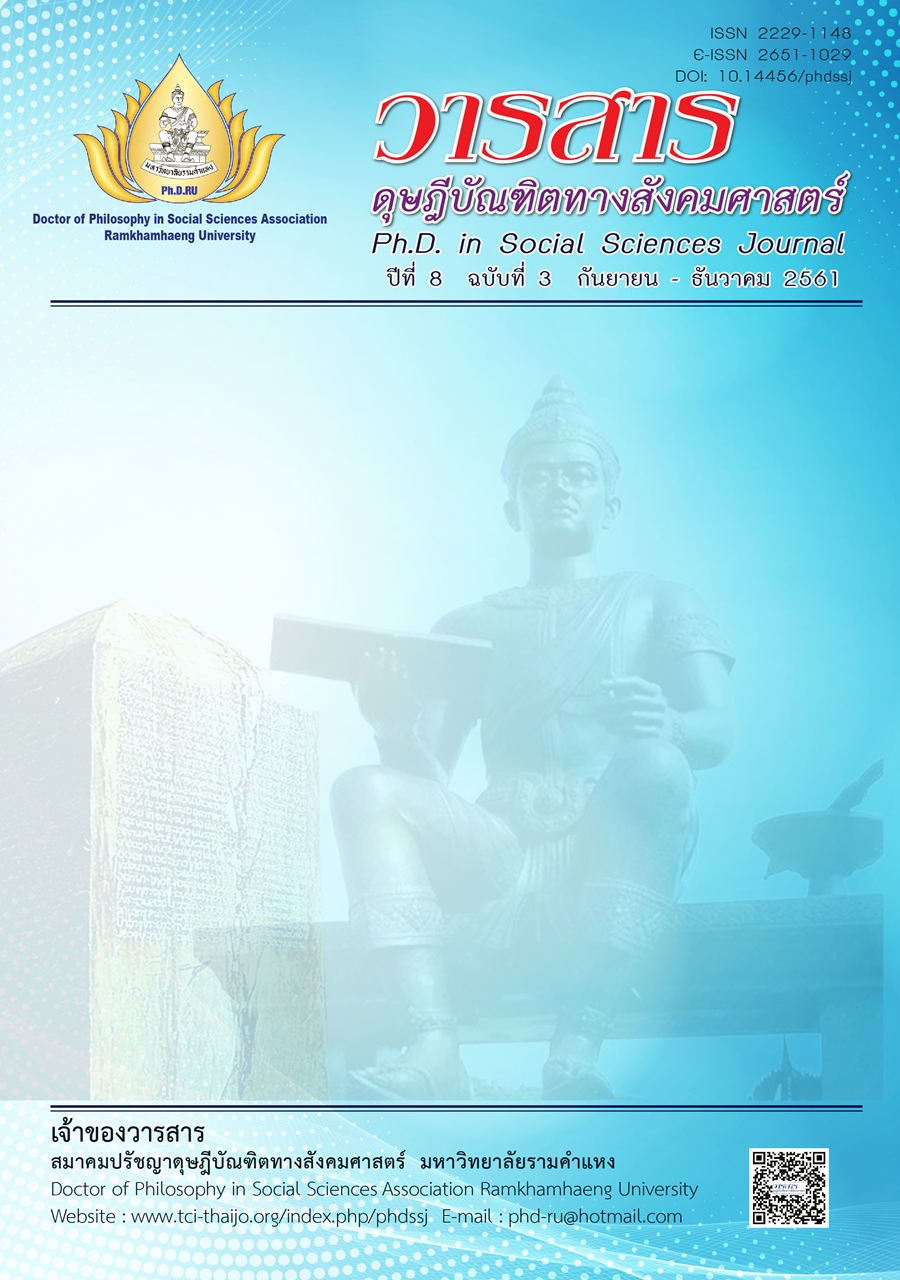The Effects of Role Breadth Self-Efficacy, Work Engagement and Organizational Justice as Moderators Changing the Relationships Between Talent Mindset Competency and Job Performance
Main Article Content
Abstract
In this dissertation, the researcher studies (1) talent mindset competency, job satisfaction, role breadth self-efficacy, work engagement, organizational justice, and job performance. (2) the influence of job satisfaction as a linking factor between talent mindset competency and job performance. (3) the influence of role breadth self-efficacy, work engagement, and organizational justice as moderators of the relationships between talent mindset competency and job performance.
In this mixed-methods research investigation, the researcher collected germane data from a sample population of 629 private sector employees involved in the juristic person business. In the qualitative phase of this research inquiry, semi-structured in-depth interviews were carried out with nine administrators from the PTT Public Company Limited group (PTT).
Findings of the quantitative research phase of investigation are as follows:
1. Findings job satisfaction; role breadth self-efficacy; work engagement; organizational justice; and job performance of private sector employees, the total Mean was evinced at a high level. But the talent mindset competency the total Mean displayed at a moderate level.
2. Findings of the influences linking job satisfaction with the talent mindset competency reduced the direct influence on job performance from 0.489 to 0.084.
3. It was indicated that work engagement and organizational justice were moderators displaying direct influence on the relationship between talent mindset competency and job performance at the statistically significant levels of 0.05 and 0.01, respectively. However, role breadth self-efficacy did not exhibit direct influence in this relationship.
Article Details
Academic articles, research articles, and book reviews in the Ph.D. in Social Sciences Journal are author’s opinions, and not the publisher’s, and is not the responsibility of the Ph.D. in Social Sciences Journal Philosophy Association, Ramkhamhaeng University. (In the case that research is done on human, the researcher has to be trained in Ethics for Doing Research on Human Training and has to produce the evidence of the training).
References
Arnold, J., Cooper, C. L., & Robertson, I. T. (1998). Work psychology: Understanding human behaviour in the workplace (3rd ed.). London: Pearson Education.
Bakker, A. B., & Demerouti, E. (2008). Toward a model of work engagement. Career Development International, 13(2), 209-223.
Bandura, A. (1977). Self-efficacy: Toward a unifying theory of behavioral change. Psychological Review, 84, 191-215.
Barb, W., & Janice, B. (2001). Retaining Your employees: Using respect, recognition, and rewards for positive results. San Francisco, CA: Crisp.
Borman, W. C., & Motowidlo, S. J. (1993). Expanding the criterion domain to include elements of contextual performance. In N. Schmitt & W. C. Borman (Eds.), Personnel selection in organizations, (pp.71-98). San Francisco: CA: Jossey-Bass.
Campbell, J. P. (1990). Modeling the performance prediction problem in industrial and organizational psychology. In M. D. Dunnette & L. M. Hough (Eds.), Handbook of industrial and organizational psychology 1 (2nd ed., pp.687-732). Palo Alto, CA: Consulting Psychologists Press.
Comrey, A. L., & Lee, H. B. (1992). A first course in factor analysis. Hillsdale, NJ: Erlbaum.
Daft, R. L. & Marcic, D. (2011). Understanding management (7th ed.). Mason, OH: South-Western Cengage Learning.
Denzin, N. (1970). Sociological methods: A source book. Chicago: Aldine.
Fu, J. R. (2006). Visual PLS–Partial Least Square (PLS) Regression: An enhanced GUI for VPLS (PLS 1.8 PC) Version 1.04. National Kaohsiung University of Applied Sciences, Taiwan.
Gist, M. E. & Mitchell, T. R. (1992). Self-efficacy: A theoretical analysis of its determinants and malleability. Academy of Management Review, 17, 183-211.
Greenberg, J. (1990). Organizational justice: Yesterday, today and tomorrow. Journal of Management, 16, 399-432.
Hayes, A. F. (2013). Introduction to mediation, moderation, and conditional process analysis: A regression-based approach. New York: The Guilford Press.
Lance, A. B., & Dorothy, R. B. (2003). The talent management handbook, creating organizational excellence by identifying, developing and promoting your best people. New York: McGraw-Hill.
MacDuffie, J. P. (1995). Human resource bundles and manufacturing performance: Organizational logic and flexible production systems in the world auto industry. Industrial and Labor Relations Review, 48(1), 197-221.
Michaels, E., Handfield-Jones, H., & Axelrod, B. (2001). The war for talent. Brighton, MA: Harward Business School Press.
Moorman, R. H. (1991). Relationship between organizational justice and organizational citizenship behaviors: Do fairness perceptions influence employee citizenship? Journal of Applied Psychology, 76, 845-855.
Parker, S. K. (1998). Enhancing role breadth self-efficacy: The roles of job enrichment and other organizational interventions. Journal of Applied Psychology, 83, 835-852.
Peccei, R., & Rosenthal, P. (2001). Delivering customer-oriented behavior through empowerment: An empirical test of HRM assumptions. Journal of Management Studies, 38, 831-857.
Rotundo, M., & Sackett, P. (2002). The relative importance of task, citizenship and counterproductive performance to global ratings of job performance: A policy-capturing approach. Journal of Applied Psychology, 87, 66-80.
Schaufeli, W. B., Martinez, I., Marques-Pinto, A., Salanova, M., & Bakker, A. B. (2002). Burnout and engagement in university students: A cross national study. Journal of Cross-Cultural Psychology, 33, 464-481.
Sigler, T. H., & Pearson, C. M. (2000). Creating and empowering culture: examining the relationship between organizational culture and perceptions of empowerment. Journal of Quality Management, 5, 27-52.
Spector, P. E. (1997). Job satisfaction: Application, assessment, causes and consequences. Thousand Oaks, CA: Sage.
Stahl, G., Bjorkman, I., Farndale, E., Morris, S. S., Paauwe, J., Stiles, P., Trevor, J., & Wright, P. (2012). Six principle of effective global talent management. MIT Sloan Management Review, 53(2), 24-32.
Stone, R. J. (2005). Human resource management (5th ed.). New York: John Wiley & Sons.
Weiten, W., & Lloyd, M. A. (2003). Psychology applied to modern life: Adjustment in the 21st Century (7th ed.). Belmont, CA: Wadsworth Thomson Learning.

